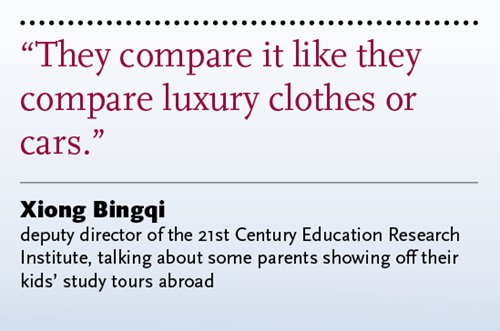
24 Aug, 2017
China’s middle class face peer pressure to send kids on study tours abroad
Beijing, 10 August 2017, (Global Times) — China’s urban middle class are under growing peer pressure to send their kids on expensive study tours abroad which have become the latest fad. Recently, a post titled “A monthly salary of 30,000 yuan could not afford [my] child’s summer holiday” has been widely circulated on social networks in China.
 Chinese primary school students visit the city hall of San Francisco during a summer camp tour. Photo: Li Qian/GT |
The author’s friend, a senior manager who earns 30,000 yuan ($4,502) a month, complained that she has dared not buy new clothes recently because the summer holiday is coming and so are big travel bills generated by her daughter.
Beijing residents on average made 7,706 yuan a month in 2016, according to the municipal bureau of statistics.
The mother says her daughter’s education cost a total of 35,000 yuan over the summer holiday, including 20,000 yuan for a 10-day US study tour and other training classes which altogether cost 10,000 yuan.
The post, which quickly went viral, was criticized by many who said that only wealthy people can suffer from these kinds of problems. Others questioned whether spending this much money on a child’s holiday is necessary.
Regardless of these criticisms, the post shows how much money middle-class families are willing to spend on their children’s education, as well as the anxiety they feel over the subject. These well-educated and well-paid people usually have high expectations of their children and are therefore easily persuaded to part with their cash.
Besides the extra-curricular classes which are within the reach of most urban families, there is evidence that more and more parents are sending their children abroad for study holidays in the hope that this will make them stand out from their peers.
The firms organizing these trips say that the children will expand their knowledge and horizons while traveling on these package holidays, which cost from 30,000 to over 60,000 yuan. These trips are seemingly becoming both a status symbol for parents and a symptom of the anxiety sparked by comparing their children with others’ offspring.
“It is doubtless that the anxiety over education exists in Chinese society and families are burdened, but if a monthly salary of 30,000 yuan could not support a holiday, there must be irrational comparisons going on,” Xiong Bingqi, deputy director of the 21st Century Education Research Institute, told the Global Times.
 |
Luxury global study
Sunny Wang, a senior manager at a newspaper in Beijing, just sent her 11-year-old daughter to Vancouver, where the girl will stay for five weeks. In the Canadian school, her daughter will not only have English classes but also visit museums, climb mountains and go swimming. At night and at the weekend, the girl will follow the schedule of her host family.
According to Wang, the trip has cost them a total of 65,000 yuan, 35,000 yuan for the tuition and flights, and an extra 30,000 yuan because her husband insisted on chaperoning their daughter.
Tens of thousands of Chinese students, from primary to high school, have joined such study tours abroad, which are organized by education centers, schools or families themselves.
In 2014, the number of students traveling abroad for education purposes reached nearly 350,000, and the number reached 500,000 in 2015, continuing to grow by 40 percent every year.
Such educational holidays are common among families living in Beijing and Shanghai. For instance, in Shanghai, it is reported that nearly 90 percent of all the students at international bilingual schools went abroad to study this year, with many heading to different countries every summer.
The most favored countries are the US, the UK, Germany, France and Australia.
These trips are so popular that some families are left disappointed. For example, a primary school in Hangzhou, Zhejiang Province, had 30 places on its tour to Australia but the names of 60 students were entered. The school interviewed the students in English and only allowed the best students onto the trip.
According to Xiong, the trend started in around 2007 and has been witnessing a sharp increase in the last five years, which is closely related to increasing incomes.
“It shows that Chinese parents are paying increasing attention to education. More and more parents hope their children can enlarge their knowledge and horizons by touring abroad. Some parents who want to send their children to school abroad also see it as preparation,” said Xiong.
But Xiao, a mother of a 9-year-old, said that the fees for such travel are too high for average families who may have to save several months’ wages to afford a trip.
“We need to spend money where it is needed most. With 30,000 yuan I’d rather go to a less popular destination with my whole family,” said Xiao.
Overwhelming anxiety
Xiao admitted that while money is one reason she did not send her son abroad this summer, she also feels the market is not well regulated, which may pose potential problems.
Currently, the market lacks clear supervision and often prices are unreasonably high. And many children have complained that they learn little on the trip and even their sightseeing is hurried.
More importantly, there are safety problems. A student once told the media that on a visit to the US in 2016 organized by a travel agency, the minibus they used had been converted from a seven-seat vehicle without the addition of proper seat belts.
But these problems seem inconsequential when weighed against Chinese parents’ enthusiasm, given the exploding market. Or, the parents maybe don’t expect much from the tours.
“I don’t have high expectations. I just hope she could learn more about the world, have a different experience and, if possible, improve her English,” said Wang who lives in Beijing. “It is huge expenditure for my family, but we think it is worthwhile.”
Many parents actually just regard such trips as a necessary experience for their children’s development, as they have increasingly become a must-do in big cities, regardless of their effect.
Lucy Wu, a Beijing accountant, said she always feels anxious about her son’s education. She said many parents choose to make their children participate in all kinds of activities because they worry that their children “may fall behind other children a bit” if they don’t catch up.
Seeing that many parents were showing off pictures of their children abroad, she entered her son’s name for a 15-day trip to the US.
But in the end she had to give up on that plan because the trip conflicted with his remedial classes, which cost her nearly 20,000 yuan every term. “Otherwise I worry he may fail to catch up in high school,” said Wu.
Some parents who send their children abroad just hope they could be regarded as equals in class discussions, because at least they have something to talk about.
Wang, an English teacher at a well-known Beijing high school, told the Global Times that every year her school sends students abroad for a study tour. And at the beginning of every term they start by inviting students to share what they did over the holidays.
Other schools ask students to write essays about their holiday. Some parents revealed online that if their children have nothing to share but training classes they feel ashamed. “Now study tours are popular, some parents feel ashamed if they don’t send their children abroad,” said Xiong.
Blind comparison
Wu says the anxiety she feels over education investment is exclusively a middle-class problem.
“The elite class doesn’t worry about money at all, and people living at the bottom of society will not worry about these trips as they have little money,” analyzed Wu. “Just the middle class, their expectations are high, and they can reach them if they go far enough, so they are anxious.”
Some experts point out that in China’s fast-changing society, the well-off middle class are anxious that they may fall off into a lower class if they don’t work hard to build on what they have acquired.
But Xiong warned that this anxiety can easily result in irrational purchases, blind comparisons and other actions which can be described as “burning money for education.”
For some middle-class people who want to distinguish themselves from working-class people, the comparison has extended from houses, cars and travel destinations to which school their children go to, which camps the children join and even their training classes.
While admitting that study tours can be valuable, Xiong pointed out that the expense of a trip does not necessarily correlate with its quality.
“Some parents don’t care what the children have gained at all, they just want to show off the fact that they went abroad on their WeChat. This mindset directly leads to the problems in the study tour sector, this fact is manipulated by tour agencies,” said Xiong.
“Some are using their big expenditure to show their ability to provide their children with a good education,” said Xiong. “They compare it like they compare luxury clothes or cars. If money can really buy educational success, then all the children of the affluent would be elite.”
“Parents need to change their views on education and stop irrational investments and comparison. Otherwise, they are ruining their children.”



Liked this article? Share it!